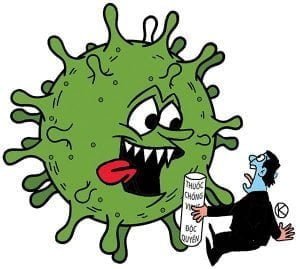
The World Health Organization (WHO) urges countries to share data about samples and genetic chains of the coronavirus to help researchers access as many information sources as possible. But the WHO expects the time to invent and produce the vaccine cannot be less than 18 months.
On 21st January 2020, the Vu Han Institute of Virology filed a patent application for a compound of Remdesivir and Chloroquine, a drug controlling the effect of 2019-nCoV. However, according to Gilead Company, located in Foster City – California (USA), Remdesivir has been registered for patent protection in many countries, including China, but not yet granted an exclusive protection title.
As such, in addition to the essential purpose is urgently making a vaccine to handle the epidemic, pharmaceutical companies and research institutes are in a rush for applying a patent for medicine or vaccine, which can prevent the disease caused by the new coronavirus.
Of course, the creation of a vaccine is not simple; financial resources and time for vaccine research are considerable. However, a patent-granted drug gives its owner the exclusive right to exploit, which means other organizations or individuals must seek for owner’s permission to use such drugs. In particular, the owner has the exclusive right to produce, trade, grant rights to pharmaceutical companies to manufacture, trade, (patent licensing), etc. It generates a vast profit to individuals and organizations and brings a reputation to the health industry of the nation where the vaccine is found.
Currently, no vaccine for Covid-19 have been successfully invented, but according to the intellectual property law, in the future, the owner of the patent of such vaccine can be determined based on the following principles:
- Principle of Territoriality: It means, an invention is protected only in the country or territory where the patent on the invention is registered and granted protection. If Gilead Company applies for a patent on Remdesivir in the U.S, not China, then the company only has the exclusive right to Remdesivir in the US market. The Chinese market can be freely exploited or excluded by other individuals or organizations.
- The “first-to-file” principle: If Gilead Company had applied for a patent on Remdesivir in China in 2016 and the Vu Han Institute of Virology had filed in China on 21st January 2020, then according to the first to file principle, Gilead Company would have been granted a patent.
Normally, under the intellectual property law, the Intellectual Property Agency will only grants a certificate for a single patent application, if there are many applications filed on the same day, the application owners will have to agree to choose for an application, if the agreement is not reached, the Intellectual Property Agency will refuse to grant a protection title to all applications.
- The priority principle: In a flat world, with diversified business activities, an invention originated from the U.S to be also exploited in the Chinese market is what both enterprises and the government of U.S desire. As such, trade agreements and international treaties build universal principles to jointly develop global trade.
With the Paris Convention, assuming that a U.S company filed a patent application for the 2019-nCoV Vaccine on 01st February 2020 in the U.S and a Chinese company do the same but on 01st March 2020 in China; then, according to the first-to-file principle, the Chinese company will be granted a protection title in the Chinese market if the U.S company makes its application later than that of the Chinese company one month.
However, because both China and the U.S are parties to the Paris Convention, the U.S Company would have 12 months from 01st February 2020 to claim a priority to be granted a patent. Accordingly, if the U.S company is prioritized, the U.S company will be granted the patent on the 2019-nCoV Vaccine in the Chinese market.
An owner of a patent must ensure the “Principle of balancing benefits” in which, for social benefits, they may be restricted their rights. The U.S Company may be recognized as the exclusive owner of vaccines in China, but with the global epidemic status, it is forced to grant rights to other companies that produce the vaccine to meet the world’s demands at a reasonable price even though they do not want. Of course, if the global emergency is no longer, the owner’s exclusive rights will no longer be limited.
The above hypothesis is in the case an individual or organization succeeds in founding a vaccine and decides to apply for a patent. However, some researchers are willing to immediately publish all of their research to society for humanitarian purposes, they do not apply for exclusive ownership. So, it will become the common property of the whole society without any exclusive owners. The society will be free to use, pharmaceutical companies are free to produce and distribute vaccines to people.
Whether or not there is a competition to be an exclusive owner of the anti-2019-nCoV virus vaccine, at this time, we hope researchers and countries may ignore their interests and share information relating to vaccine research for the greater good. The sooner a vaccine is found, the sooner infection of the virus is stopped, and damage from which people may suffer will be reduced.
Posted on The Saigon Times dated February 21, 2020.
If you have any questions or require any additional information, please contact Apolat Legal – An International Law Firm in Viet Nam.
This article is for general information only and is not a substitute for legal advice.





































